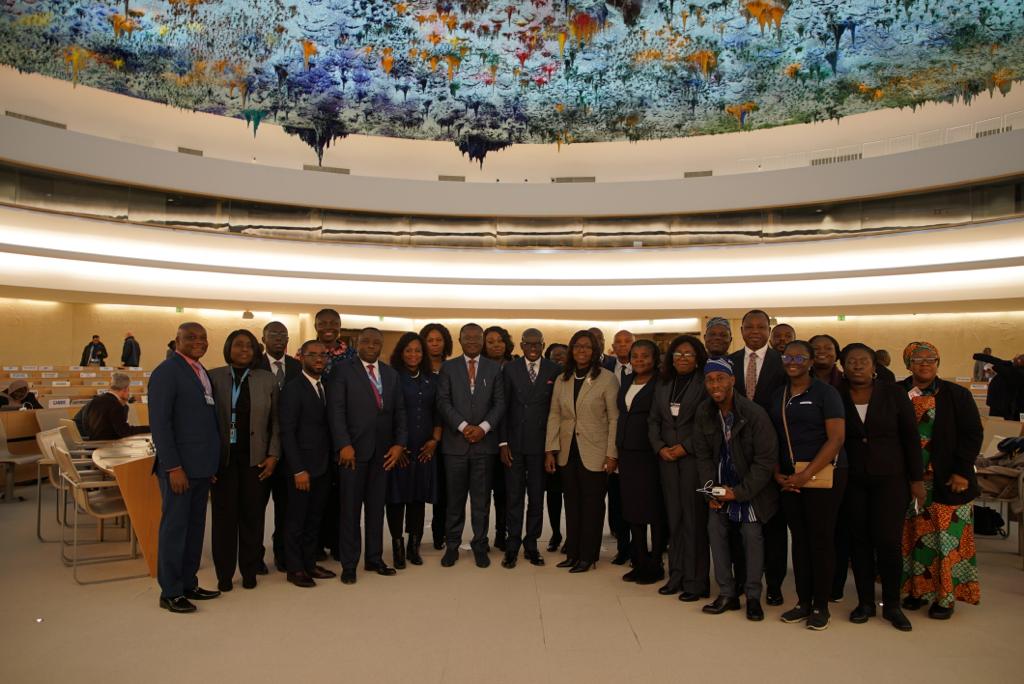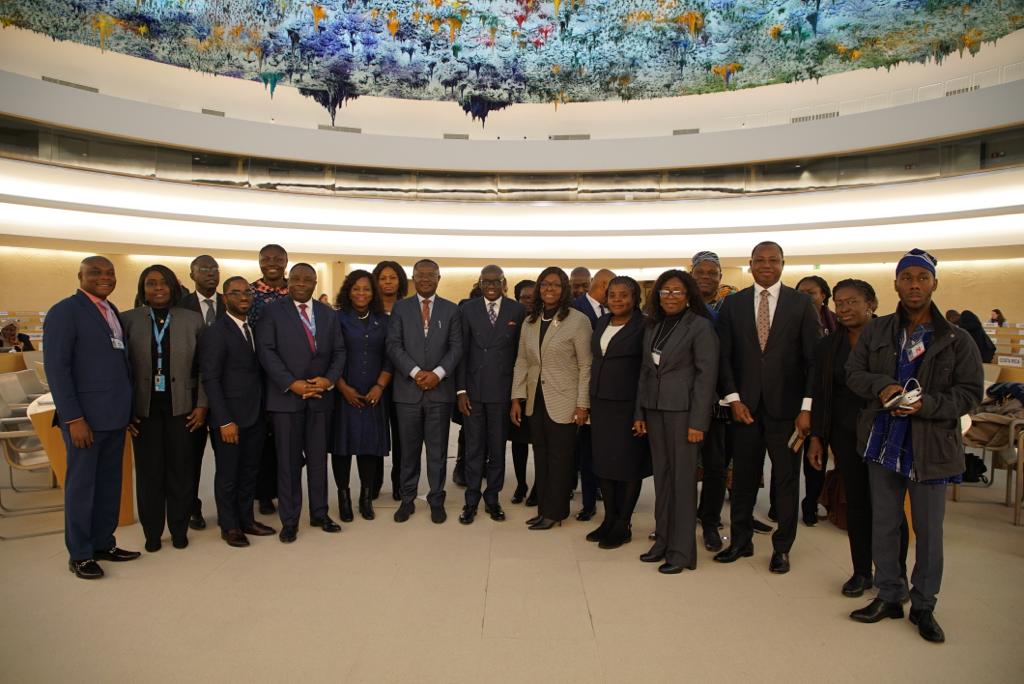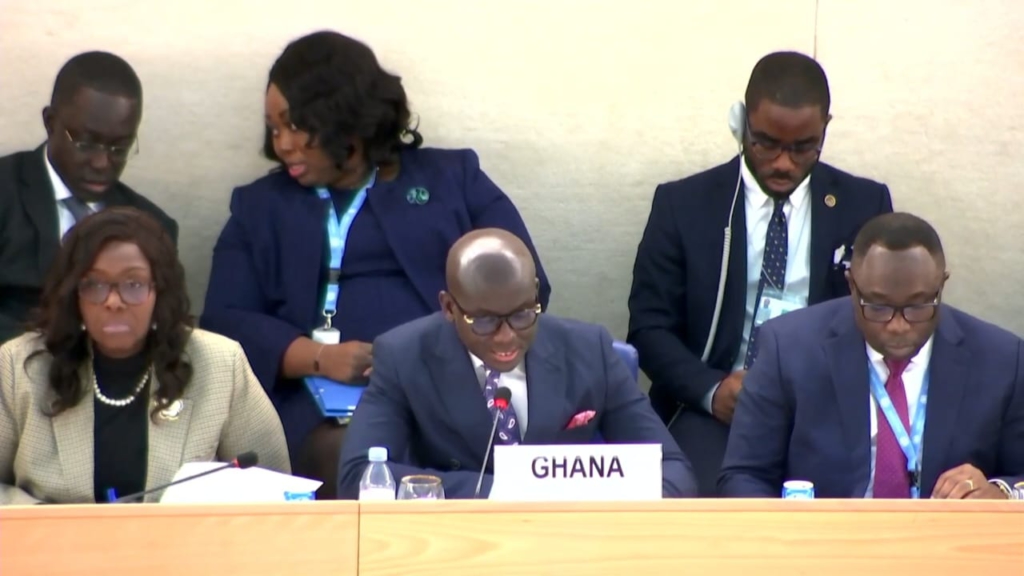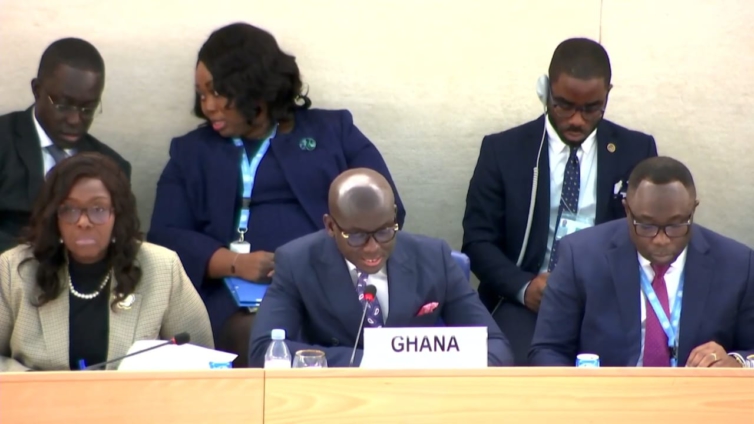The Attorney-General and Minister for Justice, Godfred Yeboah Dame, has presented Ghana’s National Report on human rights at the Fourth Cycle of the Universal Periodic Review (UPR) of the United Nations in Geneva, Switzerland.
Making a presentation at a session the Attorney-General highlighted the importance of the UPR as the principal and most successful mechanism of the United Nations Human Rights Council in examining the human rights performance of all the United Nations Member States.
He recalled that Ghana in 2017, accepted and implemented 212 out of 241 recommendations made during the 3rd cycle review.
The nation had made significant progress in its implementation despite a few challenges that the government continues to address through progressive interventions.
Mr Dame underscored that Ghana’s record in the delivery of social, and economic rights and advancements made in the area of civil and political rights are strong indicators of the nation’s strong human rights record in the global space.

He singled out the delivery of Free Secondary School (Free SHS) since 2017, strengthening of other avenues for pre-tertiary education like the Free Compulsory Universal Basic Education programme as well as Technical and Vocational Education and Training institutions, the launch of the Back-to-School Campaign aimed at ensuring that children, including pregnant school-going girls and persons with disability, access schools and ensuring access to adult education through the National Functional Literacy Programme, as powerful indicators of the extension of socio-economic rights to the citizen.
“The denial of social and economic rights can result in regular agitations by the citizenry and be a spur for instability in any nation. Ghana has made significant progress in the protection of socio-economic rights of her citizens in recent times”, the Attorney-General stated at the UN session.
On the right to quality health care, which is part of social, economic and cultural rights, Mr Dame indicated to the UN Human Rights Council that interventions since 2017 like the Newborn Care Policy (2019-2023), which aims to guide the delivery of neonatal and child health services in Ghana, implementation of Agenda 111.
Mr Dame further stated that a new Mining and Minerals Bill has been prepared to make provisions on affirmative action towards bringing more women into the industry and enhance the obligations of mining firms to the Government and host communities as well as impose mandatory Corporate Social Responsibility requirements on firms. The passage of the Cyber Security Act, 2020 has also provided specific provisions towards preventing and combating online child sexual exploitation and abuse.
In relation to civil and political rights, Mr. Dame pointed out that the phenomenon of brute violence by police officers in Ghana is on the decline following the introduction of deliberate training of all police officers not to engage in acts of torture in the conduct of arrests, investigations and interrogations.
He also highlighted the passage of the Criminal and Other Offences (Procedure) (Amendment) Act, 2022 (Act 1079) to formally introduce plea bargaining into the criminal jurisprudence of Ghana in respect of most offences, as a major step towards reducing the caseload of the courts, decongest the prisons and generally aid in reformation.
According to Mr. Dame, Ghana’s Justice for All Programme has been a major vehicle for alleviating prison overcrowding. Special courts are set up every year under this programme to adjudicate cases involving remand prisoners in prisons.

Prisoners on remand without trial or whose trial have unduly delayed, obtain a summary review of their cases and are promptly discharged from prison.
It was boosted last year with the introduction of virtual court sittings, as a result of which, a remand prisoner could sit in the confines of one’s prison and still have his application for bail heard and granted without having to attend a hearing in a physical court room.
The Attorney-General emphasised the importance and need for the nation to enact a Community Sentencing Bill.
He indicated that the Bill, which has been prepared by the Office of the Attorney-General and is undergoing stakeholder consultation, is a much-needed mechanism to further reduce congestion in Ghanaian prisons.
Mr. Dame also stated that Ghana remains committed to ensuring the rights related to name, identity and nationality are protected. In this regard, he alluded to steps by the government to strengthen these rights including the use of technology to register births; the free registration policy for children below the age of one; the visit by officers of the Births and Deaths Registry to refugee camps to register new births of refugees, asylum seekers and migrants who live in the camps.
Addressing questions on the protection of LGBTQ+ persons from violence, the Attorney-General stated that Ghana’s laws prohibit all forms of violence and brutality targeted at any group of persons.
He stressed that the State does not lend its support to any person or organization that advocates for or inflicts harm on all persons including minority groups and those of different sexual orientations.

He indicated to the United Nations that the formal position of the Government on the Promotion of Proper Human Sexual Rights and Ghanaian Family Values Bill currently before Parliament, is as contained in the opinion of the Attorney-General submitted to Parliament in October, 2022.
“The purport of the opinion”, according to the Attorney-General, is to “ensure that the Bill is in compliance with the provisions of the Constitution of Ghana, particularly, Chapter 5 of on fundamental human rights and freedoms”.
The Attorney-General’s presentation was followed by a number of questions by over 100 countries who congratulated Ghana for the strong interventions it had made to deepen the protection of human rights in Ghana.
They also expressed an interest in knowing other measures being contemplated to further broaden various aspects of human rights.
The Attorney-General and Minister for Justice stated that the invaluable comments and recommendations will guide Ghana’s continued efforts to ensure full and effective implementation of human rights instruments, policies and initiatives for the benefit of the people of Ghana.
In his closing statement, Mr. Dame commended the work of Non-Governmental Organizations (NGOs) and Civil Society Organizations (CSOs) on their effective human rights advocacy in Ghana but admonished them to recognise that there are permissible limits to freedoms and human rights, agree to build consensus with government on more critical matters and remember that the goal is to ultimately enable citizens determine their own future in dignity and independence.
The Attorney-General further emphasised to the United Nations that no single nation can say that it has achieved all in the protection of human rights but Ghana has done very well. “I am confident that you will all agree with me that attaining a perfect human rights record is an exercise in progress, and that no Member State can claim perfection. However, we go back home confident about the credentials of Ghana as a strong democratic nation with a formidable reputation in the protection of human rights and freedoms of all persons and with an independent and fearless Judiciary ready to provide a remedy for abuses”, Mr. Dame concluded.
The delegation included Joe Osei-Owusu, representing the Speaker of Parliament, together with other officials from the Parliament of Ghana.
It also consisted of senior officials of the Office of the Attorney-General and Ministry of Justice, the Ministry of Health, the Ministry of Education, the Ministry of Gender, Children and Social Protection, the Ghana Prisons Service as well as Ghana’s Permanent Mission to the United Nations in Geneva.
The Commissioner of Human Rights and Administrative Justice, Mr. Joseph Whittal and members of leading civil society groups in Ghana also observed Ghana’s presentation at the United Nations.
The UPR mechanism of the Human Rights Council is a process established by the United Nations in 2006 and involves a periodic review of the human rights records of all 193 United Nations Member States.
It provides the opportunity for each State to declare what actions they have taken to fulfil their human rights obligations and to share good practices in this regard.
Each state’s presentation is assessed by all the member states who may elect to present questions on various matters.
The UPR process offers an effective way to monitor progress towards the Sustainable Development Goals (SDGs) implementation. Ghana’s presentation this year attracted comments from over 100 states gathered at the session in Geneva.
Latest Stories
-
Trump picks Pam Bondi as attorney general after Matt Gaetz withdraws
8 mins -
Providing quality seeds to farmers is first step towards achieving food security in Ghana
18 mins -
Give direct access to Global Health Fund – Civil Society calls allocations
3 hours -
Trudeau plays Santa with seasonal tax break
4 hours -
Prince Harry jokes in tattoo sketch for Invictus
4 hours -
Akufo-Addo commissions 200MW plant to boost economic growth
4 hours -
Smallholder farmers to make use of Ghana Commodity Exchange
4 hours -
I want to focus more on my education – Chidimma Adetshina quits pageantry
4 hours -
Priest replaced after Sabrina Carpenter shoots music video in his church
5 hours -
Duct-taped banana artwork sells for $6.2m in NYC
5 hours -
Arrest warrants issued for Netanyahu, Gallant and Hamas commander over alleged war crimes
5 hours -
Actors Jonathan Majors and Meagan Good are engaged
5 hours -
Expired rice saga: A ‘best before date’ can be extended – Food and Agriculture Engineer
5 hours -
Why I rejected Range Rover gift from a man – Tiwa Savage
5 hours -
KNUST Engineering College honours Telecel Ghana CEO at Alumni Excellence Awards
6 hours

